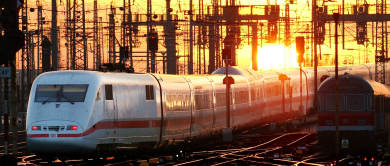Sales climbed by 4.2 percent to €31.31 billion, a railway statement said, while chief executive Hartmut Mehdorn repeated a call for the group’s partial privatisation.
The results were boosted by sales of the railway’s property unit Aurelis and its maritime transport division Scandlines, the statement said.
It added that the number of passengers carried last year had nonetheless slipped by one percent to 1.835 billion.
Walkouts staged by train drivers to press wage demands last year cost the German economy €500 million, the daily Handelsblatt reported, citing estimates by research institute Verein für Socialpolitik.
Although the damage was equivalent to less than one percent of German gross domestic product, individual companies incurred considerable costs and lost revenues, the researchinstitute’s head Friedrich Schneider was quoted as saying.
Deutsche Bahn finally agreed to an 11 percent pay increase for the drivers.
The railway said Monday that operating profit at its regional transport division DB Regio fell by 34.6 percent to €451 million, explaining that it had taken “provisions to cover high costs for energy and personnel.”
On Friday, a report in the Financial Times Deutschland said Deutsche Bahn has set aside €310 million in provisions in case the European Union commission forced it to reimburse possible state aid.
The EU commission was investigating whether a €2.1 billion contract that railway received from the German states of Berlin and Brandenburg for regional train service from 2002 to 2012 violated EU regulations, the newspaper said, citing supervisory board sources.
The contract provided the German rail operator with a sales margin of 10 percent, the report said, while the EU regards a margin of three to five percent as common. Regional train connections are Deutsche Bahn’s most lucrative operations, and with the company hoping to publicly list shares as soon as possible, an EU sanction would represent a major setback to what is already a politically sensitive issue.
Mehdorn used the release of Bahn results to press for partial privatization of the railway.
“We need a positive decision on our partial privatization in the coming weeks,” he said, noting that the group faced growing competition from publicly listed companies.
“The Bahn need fresh capital,” Mehdorn stressed, adding that it was “ready for the market.”
The last major German public monopoly appeared headed for a deal under which passenger and freight transport services would be listed on the stock exchange while ownership of the rail network would remain in state hands.
But opposition by Social Democrats (SPD) that participate in the country’s broad coalition government has slowed the process, which runs the risk of an even longer delay if it runs into the calendar for 2009 general elections.



 Please whitelist us to continue reading.
Please whitelist us to continue reading.